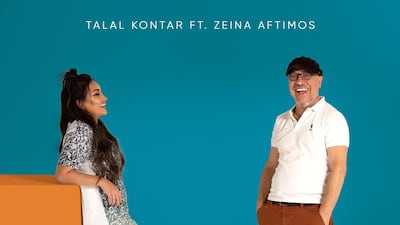They are words of advice passed down by generations of parents to children departing the Arab world: don’t forget your language.
It was wisdom given to singer-songwriter Talal Kontar upon leaving Lebanon decades ago for a stint across Europe and eventually Dubai. He recently offered the same message to his son before he moved to Spain.
"He left two months ago and I urged him to not forget the language and to hold on to it," Kontar tells The National. "But, you know, he is 14 years old. To what degree he can do that in these times will be difficult."
That particular exchange helped inspire Kontar's latest tune, Hkini Arabic (Talk to me in Arabic). Released last week with an accompanying video produced by Dubai company Spinworx, the upbeat pop track is a quirky duet with Syrian singer Zeina Aftimos.
Set in a studio, the video centres on exchanges between the pair as they paint the venue for a photo shoot.
Frustrated by Aftimos's use of English in the first verse, Kontar beseeches her "to talk to me in Arabic! I am getting lost in your words". Kontar's chorus details the struggle sole Arabic speakers go through when their native language is encroached on by foreign words. "London? No speak," he sings. "I'm working on my Arabic."
Aftimos shrugs him off and delivers her second verse in Spanish and a dash of French, much to Kontar’s eye rolls.
While the song could inspire a few nods by non-millennials, Kontar is adamant he is not the Arabic-language police.
"I am not saying that we have to solely speak in Arabic and in a specific way. All major languages evolve and welcome new words over the years. This is indisputable and this is what happened with the Arabic language today," he explains. "But the question is to what extent do we allow this to happen? I am not so much concerned with saving the language, that will always be there, but how can we develop it?"
Can Fusha be our everyday lingo?
It is a complicated question as the language, over the years, splintered across social and geographical grounds.
"In school, we learn the classical Fusha style. But tell me, where are using that now? Only in government offices and the news on television," he says. "You see the presenters talking in Fusha and then when you meet them outside they are talking casual Arabic. When that happens, you get lost and wonder why they are doing that."
In his attempt to instil an Arabic-speaking policy at home, Kontar, who has composed songs for Lebanese pop stars including Fares Karam (Shifta Bi Shareh Al Hamra) and Ragheb Alama (Arab La Hada), recalls similar exchanges with his son that brought more confusion than clarity.
"I remember at home I pointed at the window and said this is a 'shubak', which is more in line with the Lebanese dialect," he says. "And then my son told me, 'no dad, that is a 'nafida,' which is window in Fusha. What can I say after that? He is not wrong."
But isn’t knowledge of various Arabic styles and their applicability a good thing? Surely, this can result in a generation that's socially savvy and emotionally intelligent?
“You can also do that not by diluting the language at the same time,” Kontar counters. “If not, we will only interact with the Arabic language in a simplistic and superficial way. We will never know the beauty of its depth.”
One solution, Kontar offers, is to encourage the theoretical to be practical.
He points to great 20th-century poets, such as Syria’s Nizar Qabbani and Palestine's Mahmoud Darwish, as examples for stripping the classical Arabic language from unnecessary pretension.
“What they did with their work and life was make the classical Arabic language conversational,” he says. “They used it in their everyday lives and they showed us how it can touch hearts and is not something to be scared of.”
We are in this together
Kontar knows this is a tall order for an online generation.
This is why Hkini Arabic is the first piece of an unfolding personal project to develop ways to keep the Arabic language vital today.
He hopes people enjoy the tune, but also take heed of its serious message.
"The Arabic language is beautiful and varied, and we should make more use of it every day," he says. "All of us have a role in keeping it not only alive, but to evolve it and take it forward."


